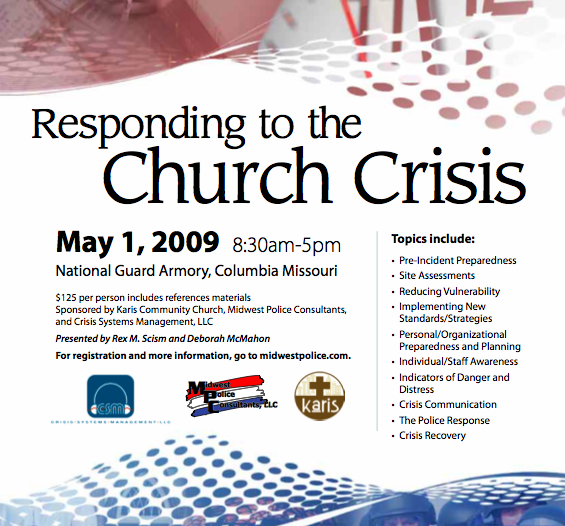Join Us For "Responding to the Church Crisis"
I recently announced that Karis was proud to be a sponsor of "Responding to the Church Crisis" presented by Crisis Systems Management on May 1st. CSM's Deborah McMahon and Rex Scism will be leading the event in Columbia's National Guard Armory. Churches around the country are wondering how they might respond if surprised on a Sunday morning by a violent intruder. This day-long seminar will help church leaders be prepared for just such an unforeseen and tragic event. Below is some additional information. Visit this site to register. Responding to the Church Crisis
Presented by Karis Community Church, Midwest Police Consultants, and Crisis Systems Management
May 1, 2009
8:30-5:00
$125.00 per person, lunch and training materials included
Registration through Midwest Police Consultants at midwestpolice.com or Karis Community Church
I. Pre-Incident Preparedness
A. Vulnerability and Site Assessments 1. Assessments 2. Reducing Vulnerability 3. Implementing new Standards/Strategies
B. Personal/Organizational Preparedness and Planning 1. Individual/staff awareness 2. Key indicators of danger & distress 3. Crisis communication
II. Mitigating the Crisis
A. Identify/Evaluate Risk Factors B. The Police Response C. Personal Protection
III. Crisis Recovery
A. Management Roles B. Critical Incident Stress Debriefing C. Re-evaluation of security/response protocols
DESCRIPTION: This 8-hour course is the first in a series of courses designed for pastoral leaders and those responsible for safety and security in a church environment. This course will provide you with a comprehensive overview of the important steps in planning for a church crisis, reducing vulnerabilities, mitigating a crisis, and dealing with the aftermath of a crisis.
A historical perspective of church violence over the last decade will illustrate the importance of preparing your ministry for a risk-effective crisis response.
You will learn the basics elements of site and threat assessments and how to use the results of an assessment to reduce vulnerability and implement new standards for safety and security.
We will discuss strategies for improving both individual and organizational awareness and preparedness.
You will also gain a basic understanding of the psychological motivations of persons in crisis and learn to recognize the characteristics of emotionally disturbed persons as well as strategies for affecting a positive outcome.
Communication during a crisis is one of the biggest challenges facing anyone responsible for coordinating a response effort. You will learn basic strategies for effective communication before, during, and after an incident.
A brief overview of the police response will give you an idea of what to expect when the police respond to a crisis as well as tips for building a collaborative relationship with law enforcement.
Lastly, we will discuss the role of church management in dealing with the aftermath of a crisis and the importance of a post-incident strategy.
PREREQUISITES: Although there are no specific requirements for attendance to this course, the information is intended for pastoral leaders, staff, volunteers, and church members involved in planning for the safety and security of a church environment and related activities. Those attendees most responsible for direct mitigation a church crisis are encouraged to attend a more comprehensive 3-day Church Resource Officer Course
COURSE REQUIREMENTS: Students must participate in 8 hours of lecture discussion in order to receive a certificate of completion.
TOPICS INCLUDE: Pre-Incident Preparedness Vulnerability and Site Assessments Reducing Vulnerability Implementing new Standards/Strategies Personal/Organizational Preparedness and Planning Individual/Staff Awareness Key Indicators of Danger & Distress Crisis Communication Mitigating the Crisis Identify/Evaluate Risk Factors The Police Response Personal Protection Crisis Recovery Critical Incident Stress Debriefing Re-evaluation of Security/Response Protocols
PRESENTED BY: Mr. Rex Scism and Ms. Deborah McMahon have more than 50-years of combined law enforcement experience including extensive specialized experience in crisis incident planning and management and workplace violence.
